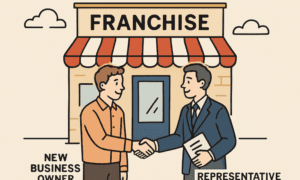Buying a franchise offers the allure of stepping into a proven business model, but it’s far from a guaranteed path to success. How do you navigate the complexities and make an educated decision?
The Franchise Landscape
The concept of franchising has revolutionized the business world over the past several decades, giving entrepreneurs a way to enter into already established markets with proven business models and brand equity. Likewise, it’s allowed franchisors to expand their brand and capitalize on the systems they’ve built without having to take on 100 percent of the risk and responsibility for each individual unit.
There are literally thousands of franchises, with industries like fast food, fitness, and home services leading the way. Top franchises in the United States include Chick-fil-A, The UPS Store, Ace Hardware, McDonald’s, Wendy’s, Jiffy Lube, and RE/MAX.
From the outside looking in, it’s easy to look at these names and think “easy money,” but that’s not always the case. While these companies are highly successful on a macro level, it takes a lot of work and considerable risk from franchisees on a micro level to make sure they’re successful.
Prospective franchisees should be aware that their own effort, dedication, and ability to manage the business effectively play crucial roles in determining the outcome. The misconception that a franchise will automatically lead to prosperity can lead to poor decision-making and unrealistic expectations. And it’s for those reasons that careful due diligence is required.
4 Tips for Smart Franchise Investing
If you’re considering going the franchise investing route, here are several tips you’ll want to keep in mind as you go down this path:
- Understand the Franchise Disclosure Document (FDD)
One of the first critical steps in any early evaluation of a franchise is to review and understand the Franchise Disclosure Document, or FDD. This is a legal document that the franchisor is required to provide potential franchisees. It offers important insights into the terms, conditions, and obligations of the relationship.
Within an FDD, you’ll find several sections that provide essential information. While you’ll want to read every single word of it, the major things to understand are franchise fees, initial investments, royalties, litigation history, and other background information.
- Know the Initial Fees and Investments
The initial fee/investment is obviously very important. However, you should also pay close attention to ongoing costs like royalties and advertising contributions.
Understanding financial obligations is crucial for assessing the feasibility of the investment and projecting potential profitability.
Here are some of the big ones:
- Initial franchise fee. The initial franchise fee is the upfront payment you make to the franchisor for the right to operate their business under their established brand and system. This fee can vary significantly from one franchise to another and typically covers initial training and support.
- Royalty fees. Royalty fees are ongoing payments made to the franchisor, usually on a regular basis (often monthly or quarterly). These fees are typically calculated as a percentage of your gross sales. Make sure you understand the royalty structure and how it may impact your profitability over time.
- Advertising and marketing commitments. Many franchisors require franchisees to contribute to a shared advertising and marketing fund. This fund is used to promote the brand at a regional or national level. While it can be a powerful tool for brand recognition, you should know how much you’re expected to contribute and how these funds are allocated.
These are just some of the big ones to take into account. You also have to consider expenses like leases, equipment and supplies, franchise renewals, training, and support.
- Consult With a Franchise Law Attorney
You never want to buy a business without having an attorney look over the terms of the deal first. And if you’re buying a franchise, you need a specialized attorney.
As franchise law attorney H. Glenn Alberich explains, “Franchises continue to be a profitable business endeavor, benefiting both the seller and the buyer. However, there are still challenges and risks involved with any commercial investment.”
By working with a franchise law attorney, you get someone who understands the ins and outs of these deals and knows which red flags to look for. They can also help explain some of the verbiage of FDDs so that you know precisely what you’re getting.
- Evaluate Support Systems
There’s immense value in having a support system in place when you invest in a franchise. (After all, a lot of the value in buying a franchise comes from the fact that there are people who have “been there and done that.”) But not all franchises have great support systems, so you’ll have to do your research and identify the ones that do.
When evaluating support systems, consider the following:
- Training programs. Keep an eye out for comprehensive training programs that help you on the front end. Some franchisors will take you away for a week to train at an actual franchise so that you can get your feet wet before starting.
- Marketing assistance. Is there any sort of marketing assistance available from the franchisor? Or are you required to cover everything on your own?
- Operational guidance. You have to understand the operations and systems in order to have the kind of success the franchisor wants you to have. Make sure they offer some type of operational guidance as it relates to inventory management, staff training, quality control, etc.
- Ongoing support. You’re going to encounter the steepest learning curve right away. However, even after you’ve been in the business for several years, there will still be situations where you need support. Evaluate how good the franchisor’s ongoing support is.
Your first 6-18 months of owning the franchise are going to be challenging. Having this kind of support within reach is massive. Don’t underestimate this!
Finding the Right Franchise Opportunity
Just because a franchise opportunity is presented to you, doesn’t mean you should immediately jump on it. The key to being successful in business is learning how to turn down good opportunities for great ones. If, after your due diligence and consulting with a franchise law attorney, you don’t feel great about the investment, go back to the proverbial drawing board. There will be more franchise investment opportunities in the future – be patient!



































